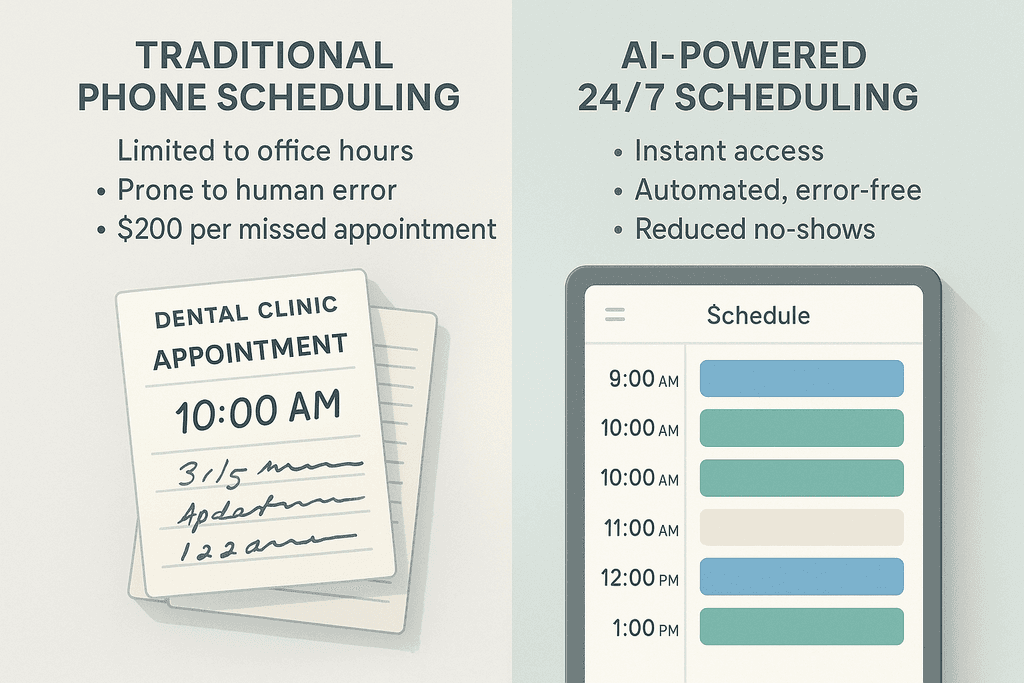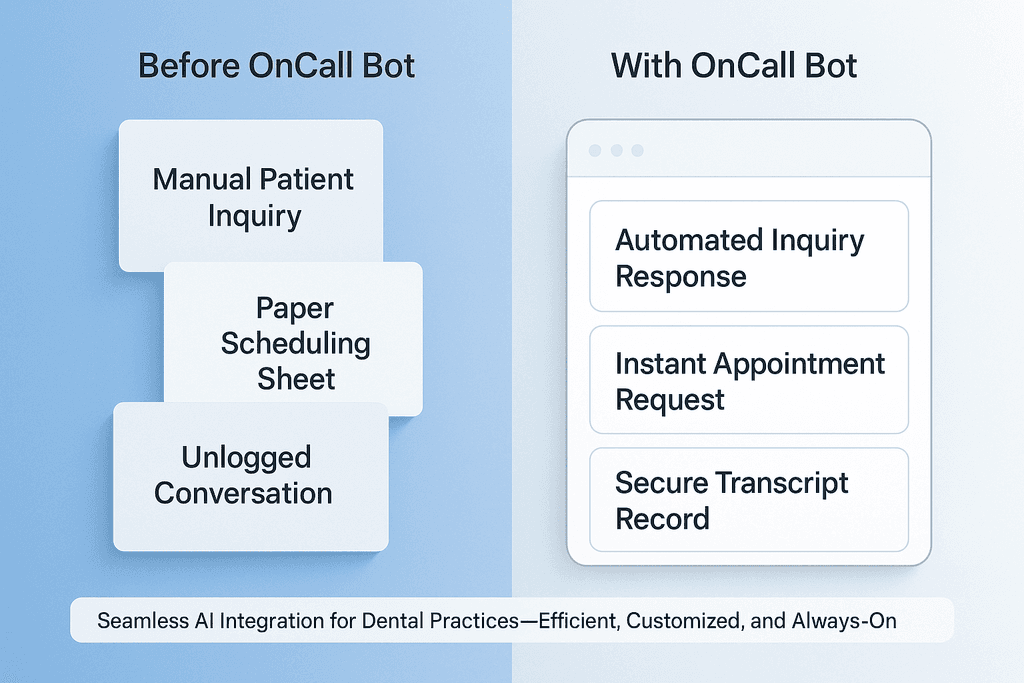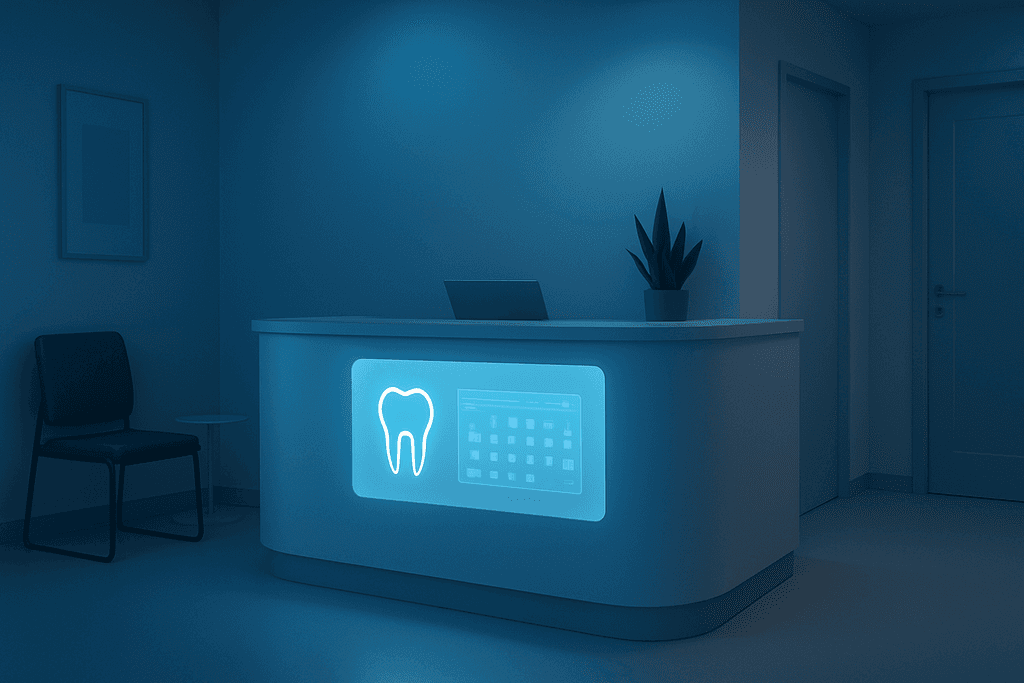Missed calls and voicemails pile up after your dental office closes, leaving patients frustrated and staff overwhelmed. Enter dental chatbots – the tireless virtual receptionists managing appointment requests 24/7. These AI assistants, like The OnCall Bot, are transforming after-hours patient care by offering instant scheduling and information, boosting satisfaction while reducing administrative burdens.
Table of Contents
The Evolution of Dental Appointment Scheduling
Missed appointments cost dental practices an average of $200 per no-show. This financial hit, combined with patient frustration over limited booking options, has pushed the industry to rethink scheduling.

Traditionally, dental offices relied on phone-based scheduling, which had several drawbacks:
- Limited to office hours
- Prone to human error
- Time-consuming for staff
- Inconvenient for patients with busy schedules
The rise of online booking systems marked the first step towards modernization. These systems offered 24/7 availability but lacked the personal touch of human interaction.
Enter AI-powered chatbots. These virtual assistants are changing the game for dental practices by:
- Providing round-the-clock scheduling
- Answering common patient questions
- Reducing staff workload
- Improving patient satisfaction
A recent study found that 78% of patients prefer booking appointments online. Dental chatbots cater to this preference while offering a more interactive experience.
Here’s how dental chatbots stack up against traditional methods:
| Feature | Phone Scheduling | Online Booking | Chatbots |
|---|---|---|---|
| 24/7 Availability | No | Yes | Yes |
| Personalized Responses | Yes | No | Yes |
| Instant Confirmation | No | Yes | Yes |
As dental practices aim to boost efficiency and patient satisfaction, chatbots are becoming an essential tool. The OnCall Bot, for instance, handles after-hours appointments with ease, ensuring practices never miss a booking opportunity.
How Dental Chatbots Handle Appointment Requests
Dental chatbots are changing the game for after-hours scheduling. These smart assistants use natural language processing to chat with patients just like a human would. When someone messages late at night about booking an appointment, the bot steps in to help.
Here’s how it typically works:
- The patient sends a message asking to schedule
- The chatbot asks about preferred dates and times
- It checks the practice’s calendar for openings
- The bot suggests available slots to the patient
- Once confirmed, it adds the appointment to the system
The cool part is how these bots integrate with existing software. They plug right into the practice management systems dentists already use. This means appointments booked by the bot show up instantly in the office schedule.
But what about tricky situations? Dental chatbots can handle those too. If a patient needs multiple appointments or has special requirements, the bot knows to flag this for the office staff to review in the morning. It’s like having a super-smart receptionist working 24/7.
Benefits for Dental Practices and Patients
Using chatbots for after-hours scheduling is a win-win. Let’s break down the perks:
- For patients:
- Book anytime, even at 2 AM
- No waiting on hold or playing phone tag
- Quick, easy process
- For dental practices:
- Less admin work for staff
- Fewer missed calls and lost opportunities
- Happier patients who appreciate the convenience
The 24/7 availability is huge. A study on AI in dentistry found that many patients prefer booking outside office hours. By offering this option, practices can fill their schedules more efficiently.
Another big plus? Reduced no-shows. When booking is easy and patients get instant confirmation, they’re more likely to remember and show up for appointments. This means less wasted time for the dental team.

Implementing Chatbots in Your Dental Practice
Thinking about adding a chatbot to your practice? Here’s what to consider:
| Factor | Why It Matters |
|---|---|
| Ease of setup | Look for solutions that integrate smoothly with your current systems |
| Customization | The bot should reflect your practice’s unique voice and policies |
| Support | Choose a provider that offers solid training and ongoing help |
Training your team is key. Make sure everyone understands how the chatbot works and what to do with the information it collects. This ensures a smooth handoff between the bot and your human staff.
Measuring success is important too. Keep an eye on metrics like:
- Number of appointments booked after hours
- Reduction in phone call volume
- Patient satisfaction scores
These numbers will help you see the impact of your new digital assistant. Our product, The OnCall Bot, makes tracking these stats easy with built-in reporting tools.
Remember, implementing a chatbot isn’t about replacing your team. It’s about freeing them up to focus on what matters most – providing great care to patients. With the right setup, a dental chatbot can become an invaluable part of your practice, working quietly in the background to keep things running smoothly day and night.
The Future of Dental Practice Management
Dental chatbots are quickly becoming indispensable tools for modern practices. By handling after-hours appointments and routine inquiries, these AI assistants are freeing up staff time and improving patient satisfaction.
Let’s examine the key ways chatbots are reshaping dental office operations:
- 24/7 availability for patient questions and scheduling
- Reduced phone call volume, especially outside business hours
- Automated handling of repetitive tasks and FAQs
- Improved patient engagement through instant responses
These benefits are leading to tangible improvements in practice efficiency. According to a recent industry report, dental offices using chatbots have seen up to a 30% reduction in administrative workload.
However, the impact of AI in dentistry goes beyond just operational gains. We’re seeing a shift in patient expectations around digital interactions. Consider these emerging trends:
- Patients increasingly prefer self-service options for basic tasks
- There’s growing comfort with AI-powered health assistants
- Younger demographics expect 24/7 access to care information
As practices adapt to these changing preferences, it’s crucial to strike the right balance between automation and personalized care. The most successful dental offices will use chatbots to handle routine matters while freeing up human staff for more complex patient interactions.
Looking ahead, we can expect AI capabilities in dental chatbots to expand further. Natural language processing is improving rapidly, allowing for more nuanced patient conversations. Integration with practice management systems will enable smoother workflows. At TheOnCallBot, we’re continually enhancing our dental AI assistant to stay ahead of these trends and provide cutting-edge support for practices.
The future of dental practice management is clearly digital, with AI playing a central role. By embracing these technologies thoughtfully, dental offices can improve operations, enhance patient care, and position themselves for long-term success in an evolving healthcare landscape.
Wrap-up
Dental chatbots are changing how practices handle after-hours appointments. They give patients 24/7 access while freeing up staff time. The OnCall Bot, for example, manages appointment requests and answers common questions around the clock.
These AI assistants do more than just book appointments. They provide detailed conversation records, helping practices follow up efficiently. Some even offer multilingual support, making dental care more accessible to diverse communities.
For dental offices looking to improve patient care and streamline operations, chatbots are worth considering. They can handle routine tasks, letting staff focus on more complex patient needs. To learn more about how AI can help your practice, check out our guide on AI call automation.
As we wrap up, you might have some questions about implementing a chatbot in your practice. Let’s address some common concerns in our FAQ section below.
Common Questions About Dental Chatbots
How much does a dental chatbot cost?
Dental chatbot pricing varies, but many solutions offer affordable monthly plans. For example, The OnCall Bot charges a one-time $495 setup fee and $49.99 per month for unlimited patient interactions. This predictable cost structure helps practices budget effectively while potentially saving on after-hours staffing.
Are dental chatbots HIPAA compliant?
Yes, reputable dental chatbots are designed with HIPAA compliance in mind. They use encryption and secure data handling practices to protect patient information. It’s crucial to choose a provider that prioritizes data security and offers HIPAA-compliant solutions specifically for healthcare use.
Can I customize the chatbot for my practice?
Most dental chatbots offer customization options. You can typically tailor the bot’s responses, add specific information about your practice, and set up custom workflows for appointment scheduling. Some providers, like The OnCall Bot, even allow you to give the chatbot a unique name to match your practice’s branding.
How do patients interact with dental chatbots?
Patients can interact with dental chatbots through various channels, including your practice’s website, Facebook Messenger, or SMS. The chatbot uses natural language processing to understand patient queries and provide relevant responses about services, scheduling, and general dental information.
What types of tasks can dental chatbots handle?
Dental chatbots can manage a wide range of tasks, including:
- Answering frequently asked questions
- Scheduling and rescheduling appointments
- Providing post-treatment care instructions
- Sending appointment reminders
- Collecting basic patient information
This automation helps streamline office operations and improve patient engagement, especially outside of regular office hours.
How do dental chatbots impact staff workload?
Dental chatbots can significantly reduce staff workload by handling routine inquiries and appointment requests. This allows your team to focus on more complex tasks and in-person patient care. Many chatbots, including The OnCall Bot, provide detailed interaction transcripts, making it easy for staff to follow up on patient needs efficiently.

No responses yet